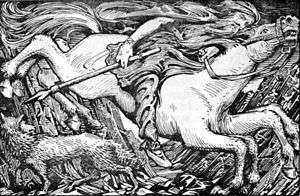Baldrs draumar

Baldrs draumar (Baldr's dreams) or Vegtamskviða is an Eddic poem which appears in the manuscript AM 748 I 4to. It describes the myth of Baldr's death consistently with Gylfaginning. Bellows suggest that the poem was composed in the mid 10th century as well as the possibility that the author also composed Völuspá or at least drew from it, pointing at the similarity of stanza 11 in Baldrs draumar and stanzas 32-33 in Völuspá.[1]
Synopsis and text
Baldr has been having nightmares. Odin rides to Hel to investigate. He finds the grave of a völva and resurrects her. Their conversation follows, where the völva tells Odin about Baldr's fate. In the end Odin asks her a question which reveals his identity and the völva tells him to ride home.
Here follows the full text and translation.[2]
Senn váru Æsir allir á þingi ok Ásynjur allar á máli, ok um þat réðu ríkir tívar, hví væri Baldri ballir draumar. Upp reis Óðinn, alda gautr, ok hann á Sleipni söðul of lagði; reið hann niðr þaðan niflheljar til; mætti hann hvelpi, þeim er ór helju kom. Sá var blóðugr um brjóst framan ok galdrs föður gól of lengi; fram reið Óðinn, foldvegr dunði; hann kom at hávu Heljar ranni. Þá reið Óðinn fyrir austan dyrr, þar er hann vissi völu leiði; nam hann vittugri valgaldr kveða, unz nauðig reis, nás orð of kvað: ‘Hvat er manna þat mér ókunnra, er mér hefir aukit erfitt sinni? Var ek snivin snævi ok slegin regni ok drifin döggu, dauð var ek lengi.’ Óðinn kvað: ‘Vegtamr ek heiti, sonr em ek Valtams; segðu mér ór helju, ek mun ór heimi: Hveim eru bekkir baugum sánir, flet fagrlig flóuð gulli?’ Völva kvað: ‘Hér stendr Baldri of brugginn mjöðr, skírar veigar, liggr skjöldr yfir, en ásmegir í ofvæni; nauðug sagðak, nú mun ek þegja.’ Óðinn kvað: ‘Þegj-at-tu, völva, þik vil ek fregna, unz alkunna, vil ek enn vita: Hverr mun Baldri at bana verða ok Óðins son aldri ræna?’ Völva kvað: ‘Höðr berr hávan hróðrbaðm þinig, hann mun Baldri at bana verða ok Óðins son aldri ræna; nauðug sagðak, nú mun ek þegja.’ Óðinn kvað: ‘Þegj-at-tu, völva, þik vil ek fregna, unz alkunna, vil ek enn vita: Hverr mun heift Heði hefnt of vinna eða Baldrs bana á bál vega?’ Völva kvað: ‘Rindr berr Vála í vestrsölum, sá mun Óðins sonr einnættr vega: hönd of þvær né höfuð kembir, áðr á bál of berr Baldrs andskota; nauðug sagðak, nú mun ek þegja.’ Óðinn kvað: ‘Þegj-at-tu, völva, þik vil ek fregna, unz alkunna, vil ek enn vita: Hverjar ro þær meyjar, er at muni gráta ok á himin verpa halsa skautum?’ Völva kvað: ‘Ert-at-tu Vegtamr, sem ek hugða, heldr ertu Óðinn, aldinn gautr.’ Óðinn kvað: ‘Ert-at-tu völva né vís kona, heldr ertu þriggja þursa móðir.’ Völva kvað: ‘Heim ríð þú, Óðinn, ok ver hróðigr, svá komir manna meir aftr á vit, er lauss Loki líðr ór böndum ok ragna rök rjúfendr koma.’ |
Later the gods were |
Form and date
The poem is one of the shortest Eddic poems, consisting of 14 fornyrðislag stanzas. Some late paper manuscripts contain about five more stanzas, those are thought to be of young origin. Sophus Bugge believed them to have been composed by the author of Forspjallsljóð, which is thought to have been written in the 17th century. Bellows, on the other hand, suggests the poem is much older but could not date it earlier than the tenth century.
Influence
The confrontation between The Wanderer (Wotan) and Erda in Act 3, Scene 1 of Richard Wagner's opera Siegfried is based upon Baldrs draumar.
The poem inspired a ballet, Baldurs draumar (Baldur's Dreams), by the Norwegian composer Geirr Tveitt, first staged in 1938.
References
- ↑ http://www.sacred-texts.com/neu/poe/poe13.htm
- ↑ Modernised from 'Baldrs draumar', in De gamle Eddadigte, ed. by Finnur Jónsson (Copenhagen: Gad, 1932), with reference to 'Baldrs draumar', in Eddukvæði: Sæmundar-Edda, ed. by Guðni Jónsson, 2 vols (Reykjavík: Íslendingasagnaútgáfan, 1949).
External links
English translations
- Baldrs Draumar Translation and commentary by H. A. Bellows
- Baldrs Draumar Bellows' translation with clickable names
- Vegtamskviða eða Baldrs Draumar Translation by Benjamin Thorpe
- Baldrs draumar Translation by W. H. Auden and P. B. Taylor
- The Song of the Traveller Translation by A. S. Cottle
Old Norse editions
- Vegtamskviða Sophus Bugge's edition of the manuscript text
- Baldrs draumar Guðni Jónsson's edition of the text with normalized spelling
- AM 748 I 4to Facsimile of the original manuscript
Other links
- Baldrs draumar: literally and literarily Article by Mats Malm